Key takeaways:
- Technology ethics influence personal and societal interactions, emphasizing the need for balance in connectivity and personal well-being.
- Integrating ethics into education fosters critical thinking, preparing students to navigate complex moral dilemmas in a technologically driven world.
- The challenges technology poses to faith include distractions from spiritual practices and the potential dilution of authentic community experiences.
- Ethical considerations in digital interactions are essential for maintaining genuine connections and safeguarding privacy within faith communities.
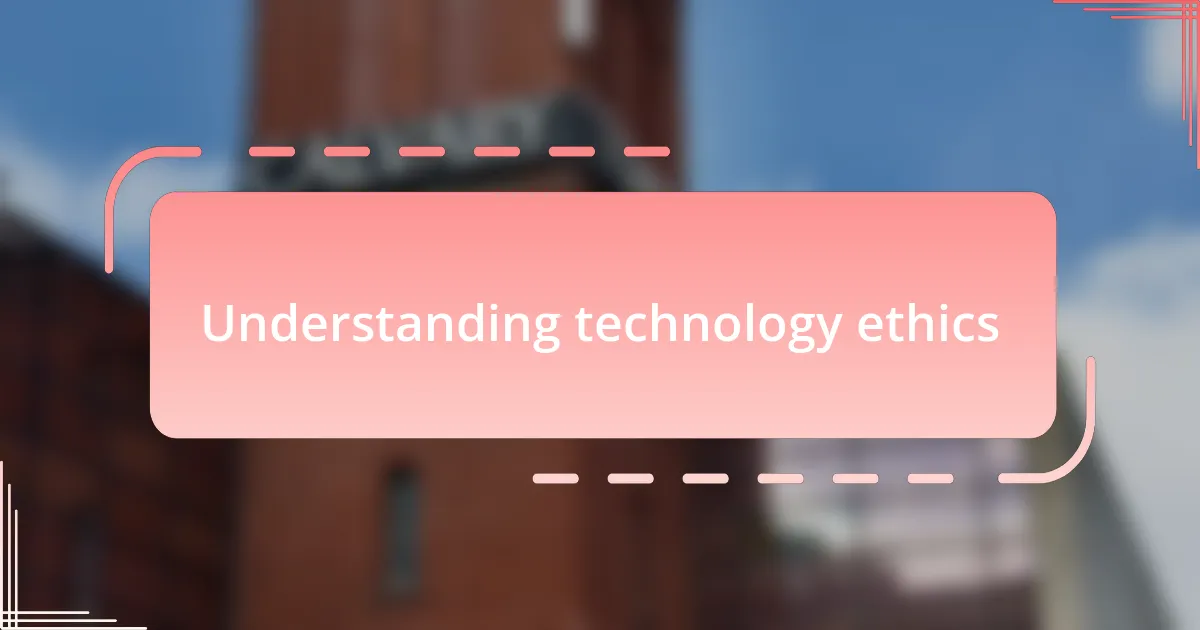
Understanding technology ethics
Technology ethics revolves around the moral principles guiding our use of technology. I often ponder how these ethical guidelines shape not just our interactions with devices, but also our relationships with one another. For instance, when I reflect on my own experiences navigating social media, I realize the thin line between connection and alienation that technology sometimes creates.
Consider moments when I’ve felt overwhelmed by the constant barrage of information online. It raises a question: how do we find balance in a world that urges us to stay constantly connected? This dilemma isn’t just personal; it’s a societal challenge we all face as we adapt to rapid technological advancements.
As I engage with this topic, I feel a sense of urgency to explore the implications of emerging technologies. What rules should guide our creations? When I hear stories of privacy invasions or manipulation through technology, it prompts a deeper reflection on our responsibilities as creators and consumers. These experiences remind me that understanding technology ethics isn’t merely an academic exercise; it’s profoundly personal and affects all facets of our lives.

Importance of ethics in education
Education is not just about imparting knowledge; it also involves instilling values. I recall a time as a student when discussions about the ethical use of technology in classrooms sparked profound conversations among my peers. Those moments taught me that ethics provide a foundational framework guiding our judgments and decisions in a world increasingly shaped by digital interactions.
When I think about the role of ethics in education, I realize how crucial it is for students to engage in critical thinking. For example, I once witnessed a class debate on the fairness of using algorithms for grading. The ideas exchanged not only challenged our perspectives but also empowered us to voice our opinions on fairness and equity. This type of engagement fosters a deeper understanding of responsibility that extends beyond the classroom.
Ultimately, ethics in education shapes the leaders of tomorrow. Reflecting on my own journey, I understand how ethical considerations can influence decision-making in various professions. As I consider future advancements, I often wonder: Are we preparing our students to navigate complex moral dilemmas? This preparation is essential, as a deep understanding of ethics ensures that they become thoughtful individuals capable of making responsible choices.
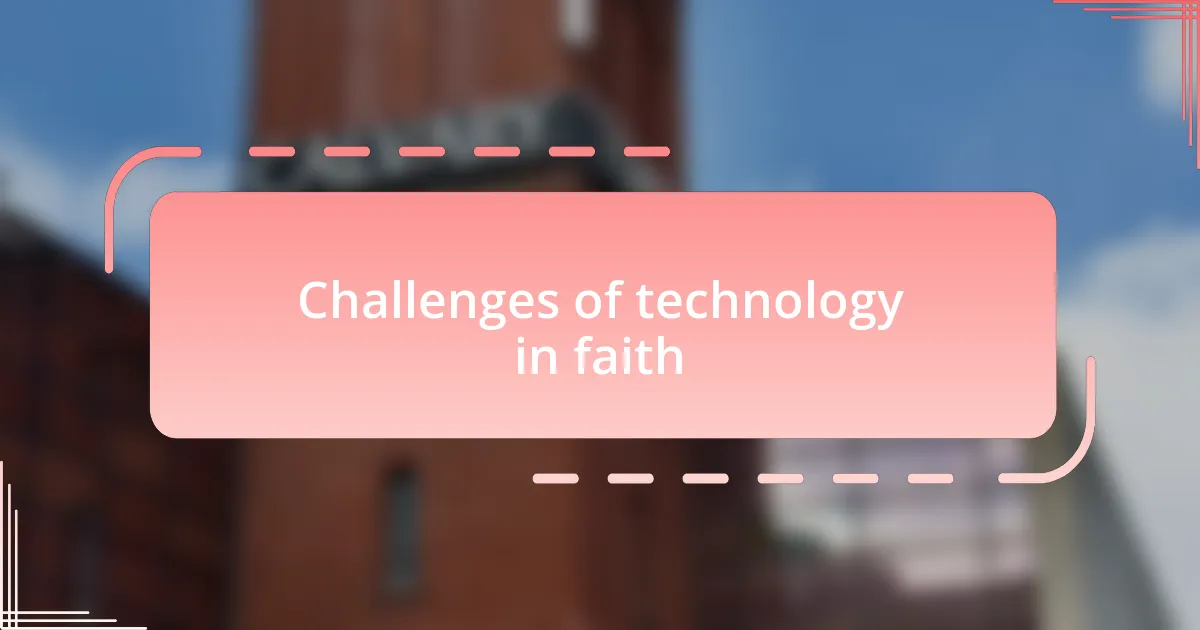
Challenges of technology in faith
When examining the challenges technology poses to faith, I often think about how easy it is for distractions to pull us away from spiritual practices. I remember a Sunday service where I noticed several people glued to their phones instead of participating in the worship. It made me question: how can we foster a genuine connection with our spirituality in an age where notifications seem to command our attention more than prayer?
Another aspect that’s hard to overlook is the rise of digital communities, which, while creating new spaces for dialogue, can sometimes dilute the authenticity of faith expressions. A close friend of mine started attending online religious forums that felt more like social media than sacred gatherings. This raised a troubling realization for me: do we risk losing the intimate, personal touch of faith when we engage behind screens rather than face-to-face?
Finally, I often reflect on the ethical dilemmas introduced by technology, such as the use of digital surveillance in religious settings. I once visited a place of worship that used surveillance for safety, but it left me uneasy. It prompted me to ask: at what point does the quest for security infringe upon the sacredness of our spiritual spaces? Balancing security and spiritual freedom remains a critical challenge as technology continues to evolve.
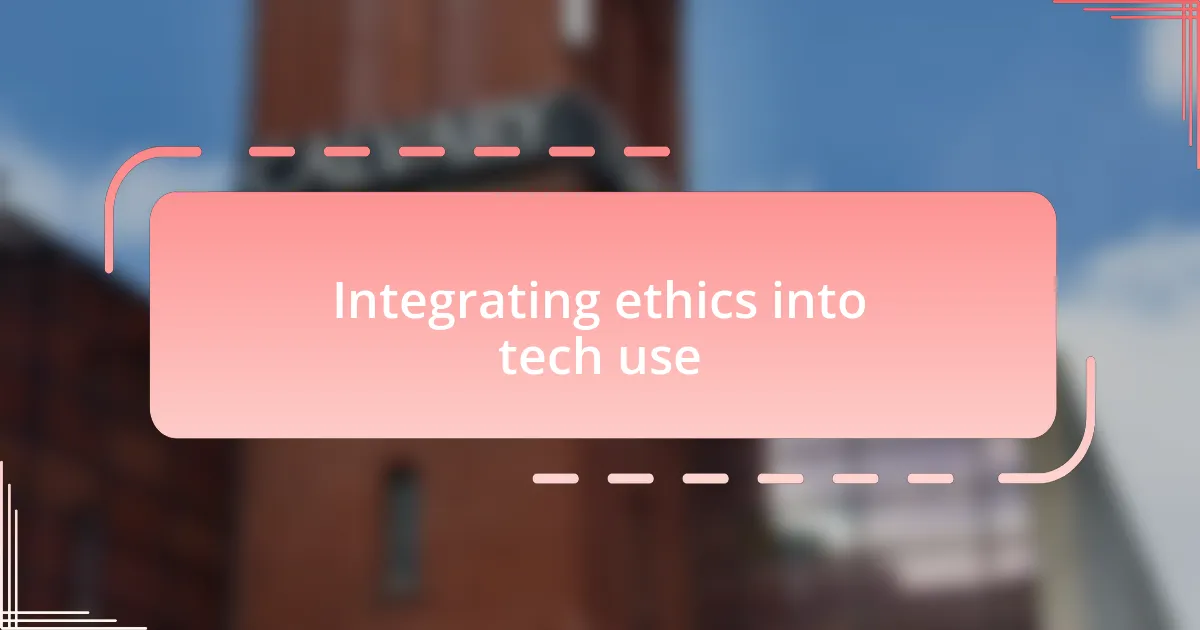
Integrating ethics into tech use
The integration of ethics into our tech usage is increasingly crucial, particularly in faith contexts. I remember a time when I attended an online lecture about the implications of artificial intelligence in religious practices. The speaker posed a thought-provoking question: “Can machines truly understand or represent the essence of what we consider sacred?” This moment made me realize that we must be careful about how we leverage technology, ensuring that our tools align with our values rather than detract from them.
When navigating the ethical landscape of technology, it’s essential to consider the potential impact on community building within our faith practices. I once joined a virtual prayer group where participants shared their experiences openly, yet I felt a tinge of sadness as I reflected on those heart-to-heart connections that typically occur in person. It led me to wonder: can we replicate the depth of emotional intimacy in digital interactions, or does technology inherently create a barrier to genuine connection?
Additionally, the ethical implications of data privacy can’t be ignored, especially when we share personal stories within our faith communities. I recall submitting a prayer request online and later receiving unsolicited advertisements related to my situation. This left me feeling vulnerable and exposed. How can we safeguard our spirituality while engaging with technology? It’s an ongoing conversation we must have, reminding ourselves that ethical considerations should be at the forefront of how we use these powerful tools.
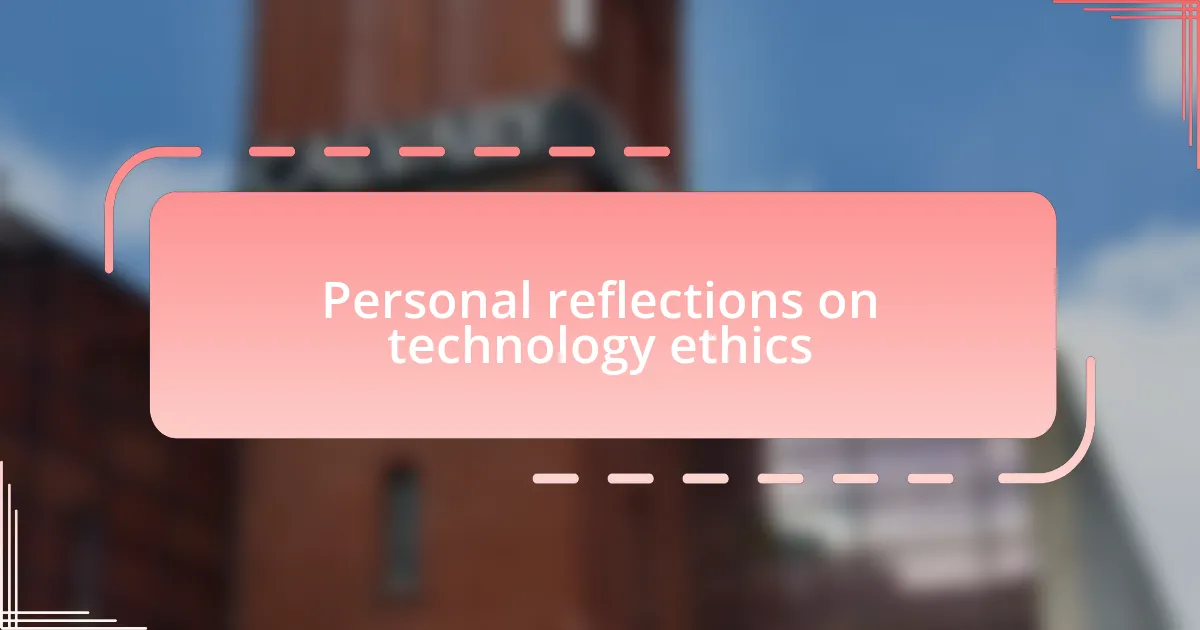
Personal reflections on technology ethics
Reflecting on technology ethics often takes me back to my experience with social media during a religious event. I remember scrolling through posts that shared heartfelt testimonials, but I couldn’t shake the feeling that these interactions, while seemingly supportive, felt somewhat superficial. Does the essence of community diminish when our connections are reduced to likes and shares? This made me reconsider how we engage in faith-based discussions online, questioning whether we are fostering true community or merely creating a digital facade.
I’ve also pondered the balance between accessibility and authenticity in our embrace of technology. During a recent webinar on faith and digital tools, I was struck by how easily we can access diverse perspectives. However, it made me uneasy to think about the risk of misinformation spreading as quickly as truth. It’s this duality that complicates our ethical stance: how do we celebrate the democratization of knowledge while ensuring we uphold the integrity of the messages we share?
One aspect of technology ethics that resonates deeply with me is our responsibility as users. I once participated in an online forum where someone shared their struggle with faith, and the responses ranged from empathetic support to harsh judgment. How can we create spaces that embody compassion in the digital realm, rather than amplifying negativity? This experience reminded me that our engagement online needs to reflect the very principles we hold dear in our communities, encouraging a culture of kindness and understanding.
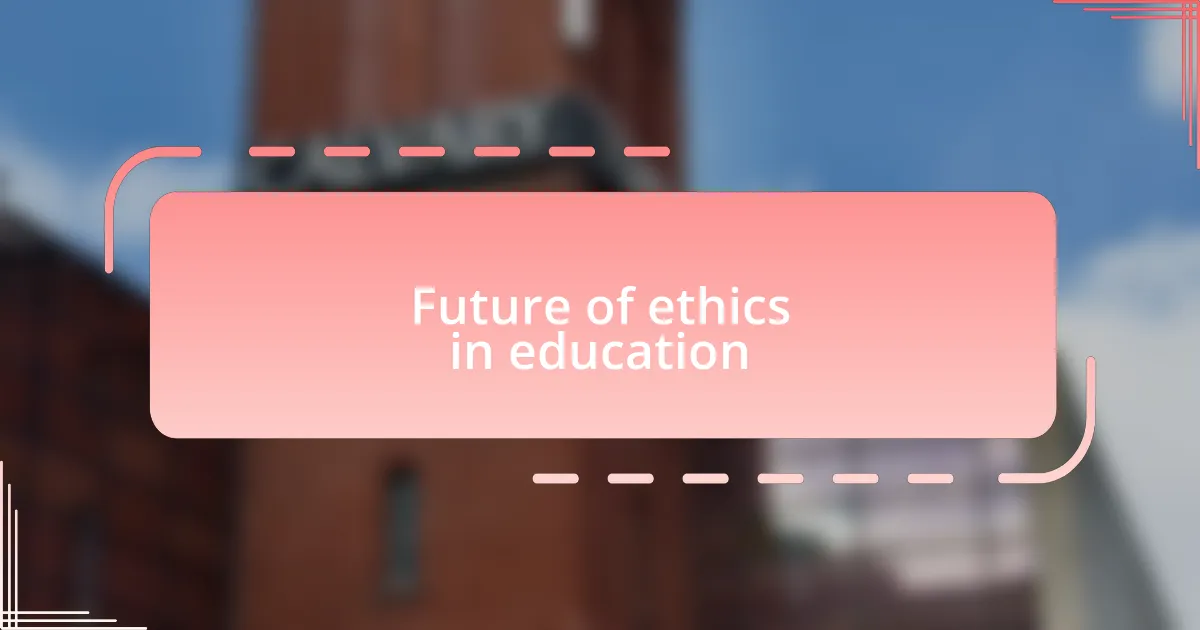
Future of ethics in education
The future of ethics in education is something I find myself increasingly concerned about as technology continues to evolve. When I think about the integration of artificial intelligence and machine learning into curriculum design, the potential benefits are palpable, but they come with significant ethical questions. For instance, who decides which content is appropriate or beneficial for students? This dilemma makes me reflect on my own experiences in educational settings where curriculum choices often seem guided by profit rather than principle.
As educators, we must prioritize teaching not just the mechanics of technology, but also its ethical implications. I remember a conversation with a group of teachers where we discussed the role of digital citizenship in the classroom. It dawned on me that promoting critical thinking about media consumption is vital. How can we guide students to become not only consumers of information but also ethical participants in the digital landscape? This perspective leads me to believe that a foundational understanding of ethics will be crucial as we prepare students for a world that demands both skill and moral judgment.
Looking ahead, I see immense value in fostering collaborations between technologists and educators. For example, if we could partner with software developers to create ethical guidelines around educational apps, it could reshape how technology is utilized in learning environments. I often wonder how such initiatives could cultivate an awareness of moral responsibility in students, empowering them to think critically about their choices. Ultimately, the shift toward integrating ethics into technology education feels less like an addition and more like a necessity in shaping thoughtful digital citizens.